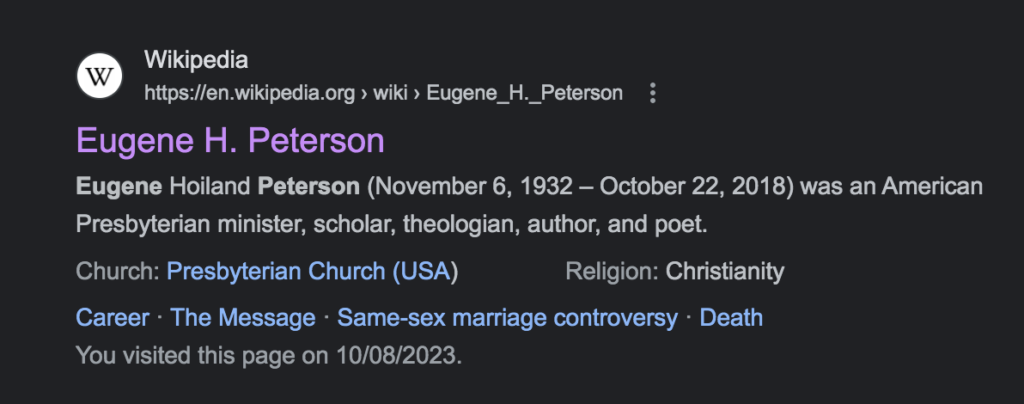
Sadly, just one year before his passing, Eugene Peterson was embroiled in an unfortunate controversy that would mar his legacy in Christendom forever. Just a simple search of him in Wikipedia will reveal that in 2017, when an interviewer asked him “if he would be willing to perform a same-sex wedding ceremony, he replied, “Yes.”” This revelation of Peterson’s stand sent shockwaves among conservative Christian circles all around the world. Although a retraction was made the following day, it was perceived by many as highly unsatisfactory on so many levels.
A Stand Divorced from Scripture
Dr. Denny Burk writes:
“Eugene Peterson has revealed that he now embraces homosexuality and gay marriage as consistent with the Christian faith. In an interview with Jonathan Merritt, he writes:
“I wouldn’t have said this 20 years ago, but now I know a lot of people who are gay and lesbian and they seem to have as good a spiritual life as I do. I think that kind of debate about lesbians and gays might be over. People who disapprove of it, they’ll probably just go to another church. So we’re in a transition and I think it’s a transition for the best, for the good. I don’t think it’s something that you can parade, but it’s not a right or wrong thing as far as I’m concerned.“
To say that Peterson’s justification for same-sex relationships is really thin would be an understatement. His is not an argument based on scripture. Rather, it’s an argument based on sentiment. He says that he’s known some nice gay people, therefore he now discards the moral consensus of the entire 2,000-year history of the Christian church. This is not pastoral wisdom. It’s folly of the first order.
Anyone familiar with Peterson will probably not be surprised by this interview. His denominational affiliation is with the PCUSA, and his views fit right in with that group. Perhaps what is more surprising is that we are only just now finding this out with this level of clarity.
Peterson says that as a pastor he had openly gay church members and even once hired an openly gay music minister. Since Peterson retired from pastoral ministry in 1991, that would suggest that his acceptance of practicing gay church members and clergy goes back at least 26 years.”
What to Make of the Retraction?
Dr. R. Albert Mohler Jr. writes:
“Peterson was then asked, “If you were pastoring today and a gay couple in your church who were Christians of good faith asked you to perform their same-sex wedding ceremony, is that something you would do?” Peterson answered simply, “Yes.”
That “yes” blew up the evangelical world like a signal flare. The RNS headline on the interview stated that Peterson had changed his mind on the question. A significant number of evangelicals responded with immediate shock and disappointment at Peterson’s answer. The largest Christian bookstore chain said that it was considering whether to continue selling Peterson’s many books, including The Message, his best-selling paraphrase of the Bible.
But, almost as quickly as his “yes” appeared, it was retracted.
The very next day, Peterson released a long statement, published in full at The Washington Post. He retracted his “yes” and said that he would actually not perform a same-sex wedding ceremony. “That’s not something I would do out of respect to the congregation, the larger church body, and the historic Christian view and teaching on marriage. That said, I would still love such as couple as their pastor.“
He also stated: “To clarify, I affirm a biblical view of marriage: one man to one woman. I affirm a biblical view of everything.“
So, within 48 hours of the original interview, Eugene Peterson had issued a statement retracting his “yes” to a same-sex wedding ceremony. He now affirms marriage as “one man to one woman.”
The brushfire then switched directions. Now, folks displeased with Peterson’s RNS interview were at least partly comforted by his retraction, while those who had been comforted by his “yes” were hurt and infuriated by his subsequent “no.”
Jonathan Merritt ran a story at RNS within hours of Peterson’s retraction, noting that in 2014 Peterson had already told a conference in which he indicated his evolution on LGBTQ issues and looking back on his tenure as pastor, he said “I started to change my mind.” He also spoke of talking to parents whose children had come out as gay saying, “they’ve finally accepted that this is not a bad thing, that this can be a good thing. This can be a flourishing thing.“
What is really going on here? What does Eugene Peterson really believe about LGBT relationships and behaviors or about same-sex marriage? We really don’t know. We will probably never really know.
His retraction allows his books to be sold, but the ordeal has done massive damage to his reputation. One of the best-selling authors in the evangelical world is now, in effect, a giant Rorschach test. You can read him as fully open to LGBT relationships, but forced by political and economic pressure to act as if he isn’t. Or you can read him as basically a traditionalist on the question, who felt under pressure to affirm same-sex marriage and succumbed to the pressure, only to regret and retract quickly. Those do not exhaust the possibilities.”
As Christians, How Then Should We Respond?
Dr. Russell Moore writes:
“So can we still learn from Eugene Peterson?
I probably wouldn’t now give his books to a brand-new believer, seeking to find a starting place in discipleship, for fear the new brother or sister might embrace the whole package—as some of us did with whomever it was that was influential in our early Christian lives, whether C. S. Lewis or J. I. Packer or John Stott or John Piper. That’s especially true, given our sexually confused culture where the definition of marriage is what’s used to tear away at a Christian anthropology. I wouldn’t now have him speak at my church or event—for the same reasons and for the fact I would never want to confuse anyone about the call to repentance.
Confusion here is a sin not just against God’s righteousness but also against God’s mercy. If we are not clear on what sin is, we cannot be clear on what God’s grace is. If something is not sin, it needs no forgiveness. Consciences know better, however we try to rationalize them away.”
